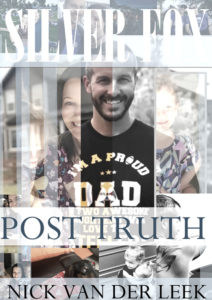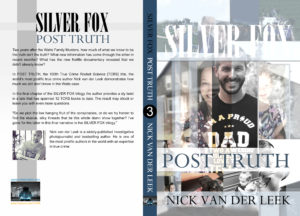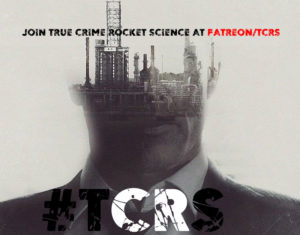Chris Watts’ trademark move is to appear cool and calm. He wants others to see him as suave and have a positive impression of him. He tries not to get flustered. Unlike Shan’ann, Watts is uncomfortable admitting to his emotions, and reluctant to show when he is upset or irritated.
This is what makes the FBI interrogation of Watts fascinating to watch. It’s a delicate dance between law enforcement and triple murderer, where both sides are trying not to antagonize the other. The main difference between the two sides is the longer law enforcement can get Watts talking, the more information they get on him, and the more they can wear him down.
This is why Watts finally “confesses” right at the end of several hours of questioning. Once he gives them what they want, he thinks it will be over, and that will be the finish line. But once he confesses, well, they’re relentless, they’re only getting started.
It should be noted that there isn’t so much a single moment when Watts gets angry, but several moments. Many of them, if not most, happen right at the end of his second day of brain-numbing grilling by two expert agents.
At 9:11 in the clip below, which is Part 9 of a total of 7 hour-long clips, Agent Tammy Lee asks Watts if she can ask him “another tough question”. She doesn’t just ask him. She doesn’t hit him on the chin with it; she asks him gently if she can ask, then she asks.
At this point Watts is fairly open about himself “losing it” but also “feeling so numb”. He refers to the children appearing “blue and limp”, something he admits he’s never seen before in his life. Seeing dead people, and killing them, is traumatic, even if it’s intentional. But it’s during this critical period where he is admitting to his emotions [regardless whether these admissions are true or not] that he starts to become emotionally authentic in the interview. He has his head down, now not even making eye-contact with his interrogators. His voice sounds weary, and somewhat high-pitched. This is not to say Watts is being truthful, just that a lot more is being leaked out here than in the rest of the interrogation.
We see this as he increasingly starts to cut Lee and Coder off. When Lee asks Watts if he thought about calling an ambulance [this is in the first version here the children were killed inside the home] Watts answers that he didn’t know what to do; they appeared completely dead to him, he says. But Lee doesn’t buy it. She tells Watts she’s been doing this job a long time, and knows something about [criminal] psychology and how people think; Watts cuts her off, telling her, “I know.”
At 12:38 Lee tells Watts “none of this makes sense”. Watts starts gesticulating wildly with his hands, at her.
WATTS: None of this makes sense. Nothing…like…[gestures] WHY SHE WOULD BE THERE…[raises his voice]…any, any of this makes sense.
Watts checks himself, then raises his hand over his face, blocking Lee off. Lee persists with another question, and Watts cuts her off again, telling her, “my God, no!” For Watts, this is as confrontational as he gets [when he’s not committing murder]. And then Coder takes over.
CODER: We’re pretty cynical in our jobs, right, and tonight we’ve had to talk a lot about a lot of things, and…[dips head]…don’t get mad, but what it looks like, is that [brushes aside his notepad, gestures to the desk]…you found a new life, and the only way to get that new life was to get rid of the old life.
We know Coder is 100% on point right here, and we know Watts knows it too. The hairs at the back of his neck ought to be standing on end. How did it make him feel, after hours of questioning, to be presented with the truth? Watts doesn’t answer. When confronted with the truth, he withdraws.
CODER: And I think that you killed these girls…before their mom came home…and then killed Shan’ann…
WATTS [Whispers]: God no.
Look at Watts’ body language. He’s shifting in his chair, he’s wiping at the left side of his face with the palm of his hand, like he’s in a nightmare he can’t get out of, can’t wake up out of.

Watts doesn’t directly answer or respond to the merits of Coder’s question. These are HUGE accusations by Coder. Watts has nothing to say, so Coder continues.
CODER: That’s what we’re left with; that’s what we have to believe. Because…it just doesn’t make sense [referring to what Lee has just said]…I mean, gestures to Lee…

This is where the subtle [but not so subtle] strategy of having two interrogators versus one suspect starts to really count. They’re just having a conversation, right? Well no, actually it’s two people from law enforcement. They’re on the same team. They’re working together, and when Watts dodges or balks at an answer, the other interrogator can say, “Hey, what she said was reasonable. Try again.” There’s no place to hide, especially when the interrogation is kept “gentle”.
CODER: To her point, if I walked in and my kid was decapitated, I’d call an ambulance….Right? It just, it just doesn’t make sense. It just doesn’t add up. So, either you’re this monster [holds up one hand]…
WATTS [Interrupts]: No.
CODER [Persisting]: I just want this young, hot girlfriend, so I’m gonna kill everyone and hope it works out, or…[holds out hand over his notepad] something. So, I think we’re very, very close to the truth, but not quite there yet.
Watts shakes his head, seems to splutter something, but is incapable here of saying anything. He has no game. He’s worn out and the anger is rising.
CODER [Pushing]: So, if you’re not that monster…
WATTS [Jumping in]: I’m not a monster. I didn’t [chops down on the table with the side of his right hand] kill…my babies.
CODER: Okay. So…tell us what actually happened.
WATTS [Under his breath]: I told you…what happened.
CODER [Gently]: I know…but…we’re getting later in the day. We’ve done this a few times and…we…we talk… then we show you a little bit of what we’re working with and the facts that we know…and then we kinda make our way to the truth.
WATTS [Choking on his words]: Everything I’ve told you is the truth.
Coder, stroking his chin, then hits Watts with a few punches to the gut. He asks Watts what’s going to happen when the cause of death comes back to him?
WATTS: It’s not going to.
CODER: You’re sure?
WATTS: I’m 100% positive…it’s not gonna come back to me.
CODER: Well, who’s it gonna come back to?
WATTS: Shan’ann was on top of Ceecee.
CODER: Okay.
WATTS [Sounding as if he’s smiling or sighing with frustration]: What do you want me to say?
CODER: I just want the truth.
WATTS [High pitched]: That is the truth.
CODER: What about Bella?
WATTS [His tone of voice sounds annoyed]: Bella was…[waves his hand] laid out, …sprawled on her bed.
CODER: Okay.
WATTS: I saw…Shan’ann on top of Ceecee so I ran in there.
CODER: Okay.
At this point both agents have their heads in their hands.
CODER [After a moment’s thought]: And then what happens when the coroner looks and sees fingerprints on her neck?
Coder gestures with his hand, against his neck.

WATTS [Murmuring softly]: They’re not gonna find my fingerprints.
CODER: Okay. What’s it gonna be?
WATTS [Sounding tearful]: It’s gonna be Shan’ann’s!
CODER [Reaches out his hand towards Watts]: Are you sure? But we don’t know about Bella, right?
WATTS [Sounding choked up]: Bella…she [speaking loudly]…that’s the commotion I heard upstairs.
CODER: Okay. [Thinks for a moment]. Why take their bodies out of the house and bury ’em?
Watts throws up his hands.
WATTS [Speaking loudly]: I was scared. I didn’t know what else to do.
CODER: Okay.
WATTS [Still speaking loudly]: Nothing-nothing…nothing was gonna…[gestures, whispers]…I didn’t know what to do.
CODER [Sighs, sits back]: Yeah.
And then Watts starts to lash out verbally. They’ve been contradicting him again and again, and now he snaps. He doesn’t just snap, it’s been coming a long time.
WATTS Loudly]: I didn’t know what everything was gonna look like! [Watts gestures to the ground as if referring to the bodies]. My two babies were gone. And I just did that to my wife.
Notice the order in which he says this.
My two babies were gone.
And I just did that to my wife.
WATTS: And I was the only one left in the house. [Shakes his head, juggles with his hands]. What do you expect is gonna happen?
This is a covert admission of premeditated murder. This was the scenario Watts asked himself before the murders.
I was the only one left in the house.
What do you expect is gonna happen?
CODER [Evenly]: It did look bad, right?
WATTS [Sounding emotional]: It looked [stutters]…I mean…a nightmare.
Watts withdraws, puts his head in his hands. This was a flash, but more is in store.
CODER: Kay…kay…
Then Lee takes over, and wheedles Watts right where it hurts.
LEE: She [Shan’ann] was a pretty good mom, right?
WATTS [Sounding tearful]: I was a pretty good dad as well. I mean you know a person until you don’t know a person.
This is also a massive concession from him, psychologically. Again and again Shan’ann said she no longer knew who Chris was, and her friends said the same.

This is because Watts had changed, he was becoming – or trying to become – a different person.
Lee gently refers to Shan’ann, Bella and Celeste being vulnerable, and if Watts isn’t being truthful about who took their lives, then “that’s on them, too”. It’s a nice way of saying if he murdered them once, then by falsely accusing Shan’ann of the murders, he’s murdering them all again.
WATTS: Uh-huh. I know.
LEE: And you don’t wanna do that to them.
WATTS [Countering, looking Lee in the eye]: I’m not doing that to them.
Well, you are.
LEE: I’m just saying-
WATTS [Interrupting loudly]: NO-NO…I’m not doing that to them.
As Lee backtracks a little, conceding that perhaps Shan’ann and Watts were good parents, Coder hits Watts with the Bad Cop routine. And this is how they successfully extract information. Push, then when he reacts, pull back, then push again, repeat, repeat, repeat.
CODER: Why didn’t you put Shan’ann in the tanks?
Long seconds tick by.
WATTS [Wearily]: I didn’t know what else to do.
Next Watts talks about how far down into the ground he buried Shan’ann. He’s able to be quite casual talking about this. He estimates maybe he dug a hole two-feet deep, and maybe it took him 20-30 minutes.
WATTS: That was the location I was going to that morning…I didn’t know what else to do. I didn’t know what else to do.
LEE: So you weren’t thinking that far ahead.
WATTS: No.
Clearly law enforcement believe he was thinking that far ahead [in other words, premeditation], but they let the point go.
Coder takes up the baton, and once again, he’s not pulling any punches. He backtracks to their discussion the day prior, where Watts had described what had happened to his family as an act of pure evil.
CODER: What does that mean?
WATTS [Contemplates for a moment, then, when he speaks, his voices croaks]: I guess…it’s the evil that I saw when…I walked behind Shan’ann...and she was on top of Ceecee. And I felt evil for what I did to Shan’ann.
The answer to Coder’s question is that the evil was him. It was the evil he felt when he walked behind Shan’ann. In some cases Watts describes himself running behind Shan’ann. Ironically, this contradiction speaks deeply into the crime scene psychology.
CODER: So…one other thing that doesn’t make sense to me…[glancing up at the ceiling]…is…well…uh…can you walk me through again, when you walked in, what did she look like? What did Shan’ann look like? All you saw was her back. Was it the same shirt that you buried her in? Same underwear? Does she wear pajamas?
WATTS: Shan’ann? No, that’s what she sleeps in.
CODER: So when you grab her, just as is, that’s how she gets to the truck, and how she gets to the site.
Watts doesn’t answer, and Coder – unfortunately, inexplicably – leaves it at that. I’ve seen this a lot in interrogations. Instead of leaving a question hanging in the air, the interrogator answers it for the suspect, which allows the suspect not to answer. This was a precious opportunity to get Watts to respond to each question, but ultimately squandered. One could also argue that of course Shan’ann wasn’t buried in the clothing she wore when she arrived home. It’s unfortunately Coder mentioned pajamas, as this line of questioning afforded Watts a way out of answering all the other questions.
And then this moment happens. Lee asks if Shan’ann ever went to bed. It’s a simple enough question. It’s a yes or no question.

Then, in quick succession Watts is asked whether he poisoned Shan’ann, whether he killed her because of the money situation and whether he tried to use her credit card to buy hair-care products [or whether she did].
Then it’s on to the next tough question.
LEE: What were you talking to Nikki [Nichol Kessinger] about before your wife got home?
This is a reference to their 111 minute conversation roughly between 21:00 and 23:00. This is something both Watts and Kessinger have in common. They have very little to say about that crucial, crucial conversation on the night of murders.
Why can’t Nichol Kessinger Remember her 111 Minute Conversation on the night of the murders?
The 111 Minute Call on Nichol Kessinger’s Phone on the night of the murders
WATTS [Playing coy, and playing for time]: Before she got home?
LEE: You talked for several hours.
WATTS [Stuttering]: We talked a lot…conversations…just…a lot of conversations.
Again, they don’t push Watts on this question.
LEE: Does Nikki know about any of this?
WATTS: No she doesn’t…well, she knows like…from the news and everything like that.
LEE: Anything else?
WATTS: No.
LEE: Did she know your wife was pregnant?
WATTS: She does now.
 Not a straight denial, is it? It’s also an uncharacteristically cocky remark from Watts.
Not a straight denial, is it? It’s also an uncharacteristically cocky remark from Watts.
LEE: How come you didn’t tell her?
WATTS: I was scared to. Felt like…you know…she wouldn’t even have gone on a date with me…if she knew that…so…
CODER: Did she know you were married with kids?
WATTS: Yes.
CODER: Okay. But just not pregnant…

WATTS: I told her that we…we actively tried…before we met.
CODER: Oh, tried to get pregnant.
WATTS: So she knew that.
CODER: What’s gonna happen when Nikki says, ‘We were planning on killing everyone and run off together’?
WATTS [Mumbles softly]: She’s not gonna say that.
At 18:24: 40, Coder and Lee tell Watts they’re going to be talking to Kessinger [they already are], and Watts rubs his face with chagrin. This is clearly a sign of distress, and how he shows it.
And so, this is the moment Watts becomes angry.
Are you sure you want to hear this?
CODER: So, are you sure she’s not going to say, ‘Hey, we were gonna kill ’em-‘
WATTS [Interrupting, plaintive]: No.
CODER: She’s not goinn say-
WATTS [Interrupts again, curt]: No.
CODER [Tries again]: Okay, she’s not gonna say, ‘We were making plans about buying a house or getting an apartment…’ She’s not gonna say that?
WATTS [Muttering]:…she’s…have my own place…just to hang out more.
CODER: Okay.
WATTS: Please don’t put her name out there. She’s been through enough in her lifetime.
CODER: We never try to put out-
WATTS [Interrupting]: It’s just that…I had an affair…and they would drag her through the mud…and I wouldn’t want that.
LEE: So what do you think about everything now? Do you feel sorry for what you did?

WATTS [Croaking]:…if I wouldn’t have lost control…and then…did that.
CODER: So after we get their bodies, things are gonna we different then. We’re gonna have a lot more questions.
At 18:30:12 Watts lets on that “maybe” the wind took the sheet at the well site.
At this point there are just 6 minutes remaining from the First Confession.


For more statement analysis and transcripts from the discovery, read the last 4 books of the series, starting with book 5 DRILLING THROUGH DISCOVERY.










































Recent Comments